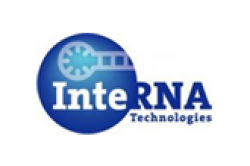InteRNA Presents Expanded Preclinical Proof-of-concept Data on Lead Oncology Development Candidate INT-1B3 at the 14th Annual OTS Meeting
October 01, 2018

--Two poster presentations highlight INT-1B3’s immune-system activation and CD8+ T cell-driven anti-tumor response in addition to its distinct MoA, targeting multiple hallmarks of cancer--
Utrecht, The Netherlands, October 1, 2018 – InteRNA Technologies announced today results from a set of confirmatory in vitro and in vivo studies further validating the unique mechanism of action (MoA) of InteRNA’s lead microRNA drug candidate, INT-1B3, for the treatment of cancer. Most strikingly, the company was able to demonstrate that INT-1B3’s earlier reported long-term memory immune protection activity against re-challenge with tumor cells is cytotoxic CD8+ T cell-mediated. INT-1B3 is a lipid nanoparticle (LNP) formulated, chemically modified microRNA 193a-3p mimic, a known tumor-suppressor microRNA, that has been shown to induce immune-modulation of the tumor microenvironment, reduction of metastases development leading to improved animal survival, and pronounced long-term immunity with a good safety and tolerability profile. The data were presented in two posters at the 14th Annual Oligonucleotide Therapeutics Society (OTS) Meeting, held in Seattle, WA from September 30 – October 3, 2018.
“These confirmatory results are consistent with the original preclinical proof-of-concept data we presented at the AACR Annual Meeting this year and thereby serve as a fundamental validation of INT-1B3’s differentiated mechanism of action,” said Dr. Roel Schaapveld, CEO of InteRNA. “It is also very exciting that we were able to demonstrate that the pronounced long-term anti-tumor immunity we have seen is CD8+ T cell-dependent which further clarifies a key aspect of these promising effects. We are convinced that INT-1B3, next to its potential in combination regimens, represents a unique and novel monotherapeutic opportunity in immuno-oncology and we look forward to evaluating its efficacy in cancer patients.”
The data presented at the 14th Annual OTS Meeting confirm and expand on the preclinical data presented at AACR in April 2018 as summarized in the following announcement http://bit.ly/2NnruRI.
In a syngeneic orthotopic mouse model of triple negative breast cancer (TNBC 4T1), systemic administration of INT-1B3 was proven to efficiently modulate the immunosuppressive tumor microenvironment. Upon resection of the primary tumors, this resulted in: 1) the inhibition of tumor re-growth, 2) reduction of distant (lung and intraperitoneal) metastases development with significant impact on animal survival, and 3) long-term immunity to newly injected 4T1 tumor cells in the absence of further drug treatment. Most notably, CD8+ T cell depletion greatly impacted protection of surviving INT-1B3-treated animals against such re-challenge with 4T1 tumor cells, suggesting a CD8+ T cell-dependent long-term immune protection. Furthermore, the results presented in a second poster verify that upon transfection in a wide panel of human tumor cell lines, the microRNA 193a-3p mimic was able to inhibit tumor cell proliferation and survival, modulate the tumor cell cycle, induce apoptosis and/or senescence and decrease tumor cell migration and invasion. In addition, and consistent with results in cell-based assays, significant anti-tumor efficacy of INT-1B3 was demonstrated in several human xenografts and in an extended panel of syngeneic subcutaneous mouse tumor models. Based on these results, INT-1B3 provides a novel and promising therapeutic approach in the immuno-oncology armamentarium.
MicroRNAs are naturally occurring small RNA interfering molecules which represent a part of the body’s arsenal to regulate gene expression, each targeting a specific set of genes that have gained recent attention as a novel therapeutic approach in a variety of disease states. MicroRNA 193a-3p specifically is a known tumor suppressor microRNA that is downregulated in many cancers. InteRNA’s formulated and chemically modified synthetic mimic combines anti-tumor activity with modulation of the immunosuppressive tumor microenvironment, and long-term immunity upon systemic delivery to cancer cells upregulating microRNA 193a-3p’s original function across the pathways involved in the initiation and progression of cancer and the evasion of the immune system in parallel.
The posters entitled “A novel synthetic miR-193a-3p mimic (INT-1B3) targeting multiple hallmarks of cancer reveals potential for therapeutic intervention in oncology” (poster #114) and “INT-1B3, a novel synthetic microRNA mimic and its monotherapy potential in immune-oncology armamentarium” (poster #63) as well as the original proof-of-concept data were presented by InteRNA’s Chief Executive Officer, Dr. Roel Schaapveld and Chief Development Officer, Dr. Michel Janicot and are available on InteRNA’s website through the following link:
https://interna-technologies.com/technology/scientific-publications/.
About InteRNA Technologies
InteRNA is developing a pipeline of proprietary preclinical microRNA drug candidates targeting key processes in initiation and progression of human diseases, with a focus on cancer. Enabled with a 3rd generation drug delivery formulation, these miRNA compounds can mount a coordinated anti-cancer attack by engaging multiple signal transduction targets simultaneously. With this approach, we address the high need for novel therapeutics with improved efficacy and less drug resistance that benefit cancer patients.
Contact:
InteRNA Technologies
Roel Schaapveld, CEO
Phone: +31 (0)24 352 96 33
E-mail: schaapveld@interna-technologies.com
Trophic Communications
Stephanie May or Joanne Tudorica
Phone: +49 2388 7733 30 or +49 171 185 56 82
E-mail: may@trophic.eu or tudorica@trophic.eu

